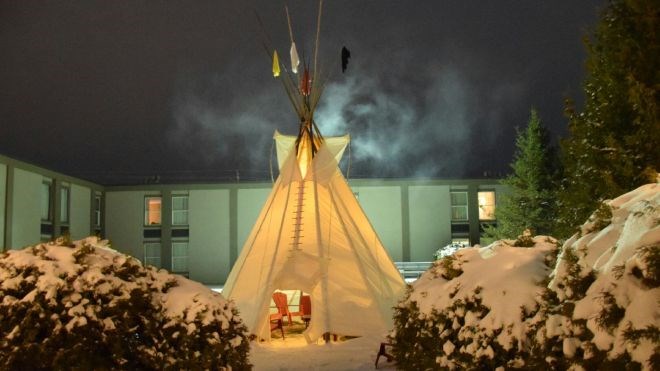A new teepee at Ramada Timmins is serving as a welcoming touchstone for Indigenous guests, who are incorporating it into their conferences and events, while also becoming a valuable teaching tool for visitors to the hotel.
Don Padley, the hotel’s general manager, said the Ramada has worked very closely with several First Nations communities over the years, many of whom come from northern communities to attend conferences and other events, as well as during flood season when community members have to relocate from their homes for as much as a month at a time.
He wanted to do something to help those guests feel more comfortable while away from home, and over the years, many visitors had spoken about the significance of the teepee and its place in the culture.
“We wanted to make them feel welcomed here,” Padley said.
“They needed a place, when they do come to Timmins, where they can do their ceremonial fires, their smudging, all the stuff that’s part of their culture, and so we thought it was a great idea.”
Padley first consulted with people from the local Indigenous community to get their feedback on how to go about it appropriately and in a culturally sensitive manner. Gary Martin, a traditional healer coordinator with the Misiway Milopemahtesewin Community Health Centre in Timmins, was an instrumental advisor during the process.
Martin sourced 15 poles for the teepee, along with a canvas from the local company Porcupine Canvas. On the day of the launch, community members from the Wabun Tribal Council and Mushkegowuk Tribal Council were invited to participate, along with local dignitaries and traditional healers, singers and drummers, and a special ceremony was conducted to bless the teepee.
Willy Metat, a Fort Albany First Nation member who works as a liaison and in sales and marketing at the Ramada, worked closely with Martin to learn the teachings associated with each pole — thankfulness, cleanliness, good child-rearing, love, strength, respect and knowledge among them — which he now passes on to curious visitors.
“Every single pole on the teepee has a teaching that goes with it,” he said.
“Now, when people come and ask me about the teepee, I will tell them a little story behind it and give them examples of what that part of the teepee means.”
Since its launch last September, the structure has been used during the Mushkegowuk Economic Forum, the Jays Care Foundation’s James Bay Girls at Bat Program, and a five-day forum for Missing and Murdered Indigenous Women, among other events.
Padley said the teepee has served as a place of gathering, personal guidance and reflection, and an opportunity for teaching and sharing of cultural awareness. Local school boards have hosted their education conferences there, using it as an opportunity to educate themselves on Indigenous issues.
“We also have lots of local groups that come for conferences, and they want to make that part of their conference,” Padley said.
“We have some local First Nations that do the singing and the drumming, and so we can reach out to them and they'll come to the hotel and actually do a performance for them.”
Indigenous conferences and conventions are a growing business, and Padley said he wants to expand what’s already been started with the teepee, making the Ramada the “go-to place” for communities booking Indigenous conferences and events.
A young local Indigenous chef is currently working on a plan to take over the hotel’s restaurant, which will have Indigenous-themed décor and a diverse menu. During the summer months, there will be opportunities to host outdoor barbecues at the teepee to feature Indigenous food favourites like bannock on a stick.
Metat is also working on setting up a craft shop on site to sell paintings and other art by local Indigenous artists, giving them more exposure, while offering visitors something to take home from their visit.
Padley said the feedback from Indigenous guests and communities has been very positive, with many seeing the Ramada’s efforts as helping to bridge cultural divides, something Padley called “a pleasant surprise.”
“We’re just at the beginning of what we can do with it, but it’s far exceeded any expectation I had from what I wanted to do originally,” he said. “We’re very happy with it.”




